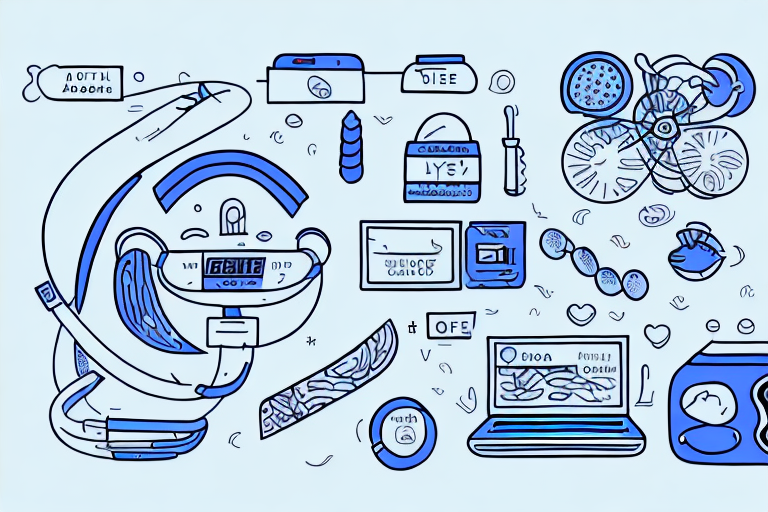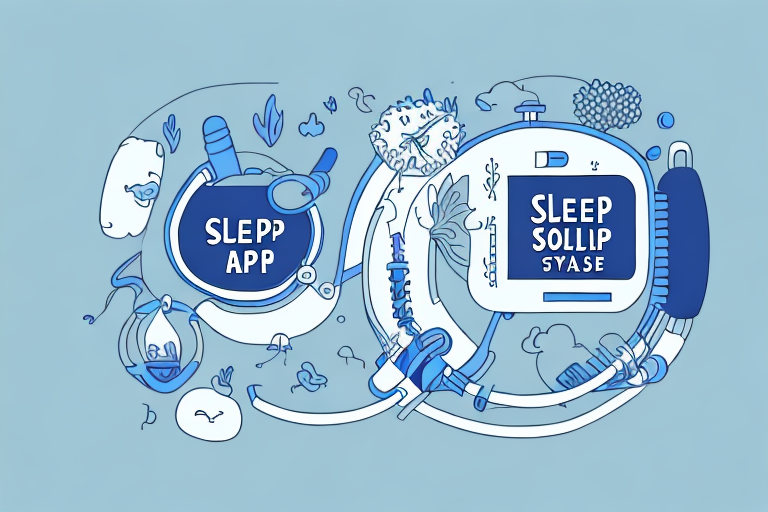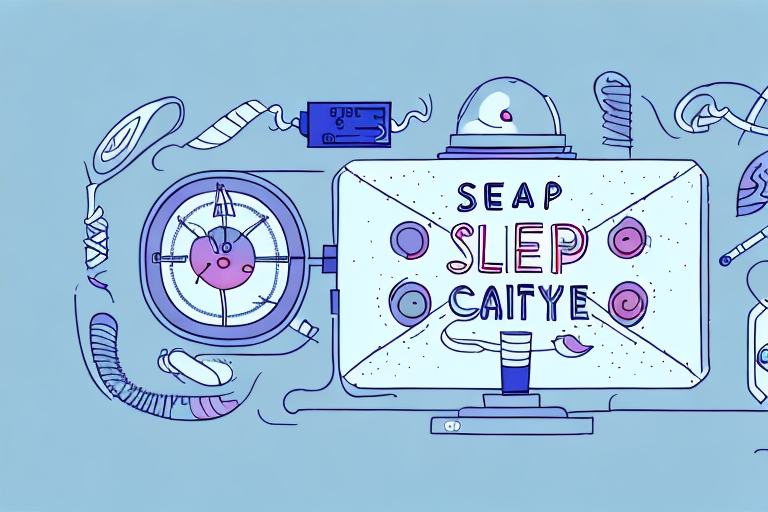A good night’s sleep is essential for our physical and mental well-being. Unfortunately, millions of Americans suffer from sleep apnea, a condition that disrupts sleep and increases the risk of other health problems.
Fortunately, sleep apnea machine can help alleviate the symptoms associated with this condition. However, to get optimal results, combining therapy with lifestyle changes is crucial.
Understanding Sleep Apnea and Its Impact on Health
Sleep apnea is a disorder that causes interrupted breathing during sleep. This break in breathing can occur dozens or even hundreds of times a night, leading to disrupted sleep cycles, daytime fatigue, and other health problems. The most common form of sleep apnea is obstructive sleep apnea (OSA), which occurs when the muscles in the throat relax and block the airway. Central sleep apnea (CSA) is a less common form that occurs when the brain fails to signal the muscles to breathe.
What is Sleep Apnea?
OSA is the most common type of sleep apnea. It usually occurs when the muscles in the back of the throat fail to keep the airway open, despite the efforts made to breathe. CSA, on the other hand, is less common and occurs when the brain fails to send the necessary signals to the muscles that control breathing.
Symptoms and Long-term Effects of Sleep Apnea
Some of the common symptoms of sleep apnea include snoring, pauses in breathing, gasping for air during sleep, dry throat in the morning, daytime sleepiness, fatigue, morning headaches, irritability, and difficulty concentrating. If left untreated, sleep apnea can lead to other health problems such as high blood pressure, heart disease, stroke, diabetes, and depression.

It is important to note that sleep apnea can also have a significant impact on mental health. Studies have shown that individuals with untreated sleep apnea are more likely to experience symptoms of depression and anxiety. This is likely due to the fact that sleep apnea disrupts the normal sleep cycle, which can lead to a decrease in the production of mood-regulating hormones.
In addition to the physical and mental health effects, sleep apnea can also impact an individual’s quality of life. The daytime fatigue and difficulty concentrating can make it challenging to perform daily tasks and activities, leading to a decreased sense of well-being.
The Importance of Proper Sleep Health
Getting proper sleep is critical to our overall health and well-being. Lack of sleep can increase the risk of obesity, high blood pressure, heart disease, diabetes, and depression. Furthermore, sleep apnea can worsen existing health conditions. Therefore, treating sleep apnea can improve overall health and quality of life.
There are several lifestyle changes that can be made to improve sleep health and reduce the risk of sleep apnea. These include maintaining a healthy weight, avoiding alcohol and sedatives before bed, establishing a regular sleep schedule, and sleeping on your side rather than your back.
If lifestyle changes are not effective, there are several medical treatments available for sleep apnea. Continuous positive airway pressure (CPAP) therapy is the most common treatment, which involves wearing a mask over the nose and/or mouth during sleep to keep the airway open. Other treatments may include dental devices, surgery, or positional therapy.
In conclusion, sleep apnea is a serious disorder that can have significant impacts on physical and mental health as well as quality of life. It is important to understand the symptoms and long-term effects of sleep apnea and to prioritize proper sleep health in order to prevent and treat this condition.
Types of Sleep Apnea Machines and Their Functions
There are several types of sleep apnea machines available to treat sleep apnea effectively. These machines work by increasing the air pressure in the airway, thus preventing the airway muscles from collapsing and causing breathing difficulties. Sleep apnea is a common sleep disorder that affects millions of people worldwide, and it can lead to serious health complications if left untreated.
People with sleep apnea often experience loud snoring, gasping for air during sleep, and daytime sleepiness. The condition can also increase the risk of high blood pressure, heart disease, stroke, and type 2 diabetes. Therefore, it’s crucial to seek treatment for sleep apnea to improve your quality of life and reduce the risk of health complications.

Continuous Positive Airway Pressure (CPAP) Machines
CPAP machines are the most common type of sleep apnea machine. They work by providing a continuous stream of pressurized air through a mask or nosepiece. This steady flow of air keeps the airway open, preventing the throat muscles from collapsing and blocking the airway during sleep. CPAP machines are typically prescribed for patients with moderate to severe sleep apnea.
CPAP machines come in different sizes and shapes, and they offer various features, such as heated humidifiers, adjustable pressure settings, and ramp-up features. Patients can choose from different mask types, including full-face masks, nasal masks, and nasal pillow masks, depending on their comfort and individual needs.
Bi-Level Positive Airway Pressure (BiPAP) Machines
BiPAP machines are similar to CPAP machines but provide air pressure at two different levels. The higher pressure setting is used during inhalation, and the lower pressure is used during exhalation. BiPAP machines are typically prescribed for patients who have trouble exhaling against the pressure of a CPAP machine.
BiPAP machines can be beneficial for patients with respiratory muscle weakness, neuromuscular disorders, or chronic obstructive pulmonary disease (COPD). They can also be useful for patients who need higher pressure settings to maintain their airway open during sleep.
Adaptive Servo-Ventilation (ASV) Machines
ASV machines are designed for patients with central sleep apnea (CSA) or complex sleep apnea, which is a combination of OSA and CSA. These machines adjust the air pressure in real-time, depending on the patient’s breathing pattern, to deliver the optimal pressure for each breath. They can also monitor the patient’s breathing and adjust the pressure to prevent episodes of apnea and hypopnea.
ASV machines are relatively new and have shown promising results in treating complex sleep apnea. However, they are not suitable for all patients, and a qualified sleep specialist should evaluate the patient’s condition before prescribing an ASV machine.
Choosing the Right Sleep Apnea Machine for You
Choosing the right sleep apnea machine can be challenging. It’s essential to work with a qualified sleep specialist who can help determine the best machine for your individual needs. Factors to consider include the type and severity of sleep apnea, the patient’s comfort, and the machine’s features and settings.
Patients should also consider the noise level of the machine, the ease of cleaning and maintenance, and the cost of the machine and accessories. Some insurance plans cover the cost of sleep apnea machines, but patients should check with their insurance provider to verify coverage.
Overall, sleep apnea machines can be life-changing for patients with sleep apnea. They can improve sleep quality, reduce daytime sleepiness, and lower the risk of health complications. With the help of a qualified sleep specialist, patients can find the right sleep apnea machine to meet their individual needs and improve their quality of life.
Integrating Sleep Apnea Machines into Your Sleep Routine
Integrating sleep apnea machines into your sleep routine can be a game-changer for those who suffer from sleep apnea. Sleep apnea is a sleep disorder that causes breathing to repeatedly stop and start during sleep. The condition can lead to daytime fatigue, high blood pressure, and other health problems. Fortunately, sleep apnea machines, also known as continuous positive airway pressure (CPAP) machines, can help manage the condition and improve sleep quality.
Setting Up Your Sleep Apnea Machine
Setting up a sleep apnea machine involves more than just connecting the machine to a mask or nosepiece. It’s essential to ensure that the mask or nosepiece fits correctly and comfortably to prevent air leaks. Additionally, the machine’s pressure settings may need to be adjusted to fit your individual needs. A sleep specialist can help with proper setup and maintenance of the machine to ensure maximum effectiveness.
It’s also important to note that there are different types of sleep apnea machines available. Some machines include features such as automatic pressure adjustment or built-in humidifiers to make the therapy more comfortable.
Adjusting to Sleeping with a Sleep Apnea Machine
Adjusting to sleeping with a sleep apnea machine can take some time, but it’s worth it for the benefits of improved sleep quality and daytime alertness. Some patients report feeling claustrophobic or uncomfortable wearing the mask at first, but these feelings typically subside with time.
It’s important to wear the mask for the entire duration of sleep, as stopping treatment early can negate any benefits. Using a heated humidifier can also help prevent dryness in the airway and make the therapy more comfortable.

Ensuring Proper Maintenance and Care
Proper maintenance and care are crucial for getting the most out of your sleep apnea machine. Regular cleaning of the mask and tubing is necessary to prevent bacteria buildup and ensure proper functioning. Filters should also be replaced as needed to prevent clogs and maintain air quality.
Periodic testing of the machine is also essential to ensure it’s working correctly and delivering the right pressure settings. A sleep specialist can help with maintenance and troubleshooting if any issues arise.
Overall, integrating a sleep apnea machine into your sleep routine can take some time and adjustment, but the benefits are worth it. With proper setup, adjustments, and maintenance, sleep apnea machines can significantly improve sleep quality and overall health.
Lifestyle Changes to Complement Sleep Apnea Therapy
While sleep apnea machines are highly effective for treating sleep apnea, lifestyle changes can also help improve sleep quality and overall health.
Weight Loss and Exercise
Weight loss and exercise can help reduce the severity of sleep apnea symptoms. Losing even a small amount of weight can make a significant difference in sleep quality and daytime alertness. Exercise can also improve overall physical fitness, which can further reduce the risk of health problems associated with sleep apnea.
Sleep Position and Environment
Sleeping on your back can exacerbate sleep apnea symptoms. Sleeping on your side can help keep the airway open and reduce the severity of sleep apnea. Additionally, creating a sleep-friendly environment, such as reducing noise and light pollution, can help improve sleep quality.
Avoiding Alcohol and Sedatives
Alcohol and sedatives can relax the muscles in the airway, which can exacerbate sleep apnea symptoms. Avoiding these substances before bed can help improve sleep quality.
Stress Management and Relaxation Techniques
Stress and anxiety can make it difficult to fall and stay asleep. Relieving stress through relaxation techniques, such as deep breathing, meditation, or yoga, can help improve sleep quality and overall well-being.
Conclusion
Combining lifestyle changes with sleep apnea therapy is crucial for optimal results. Sleep apnea machines can significantly improve sleep quality, reduce symptoms, and reduce the risk of other health problems. However, incorporating lifestyle changes, such as weight loss, exercise, and relaxation techniques, can further improve overall health and well-being. If you suspect you have sleep apnea, it’s essential to seek diagnosis and treatment from a qualified sleep specialist.

